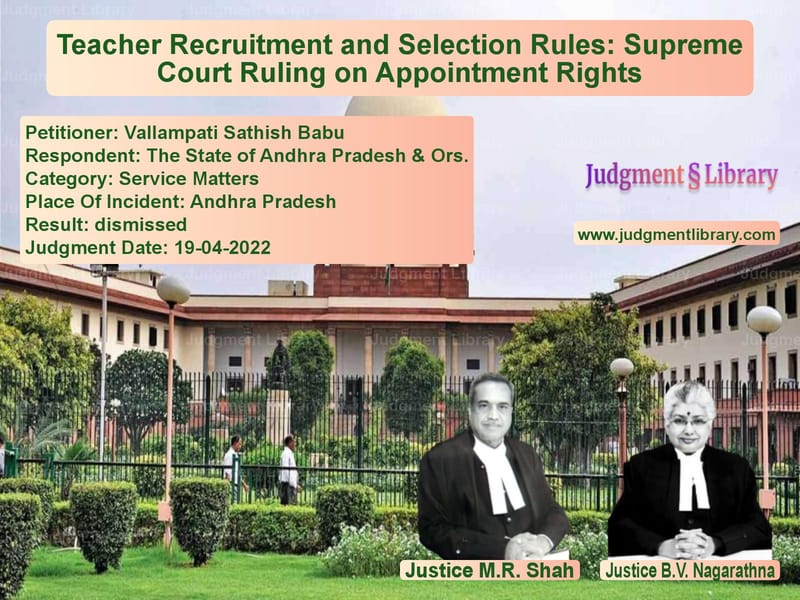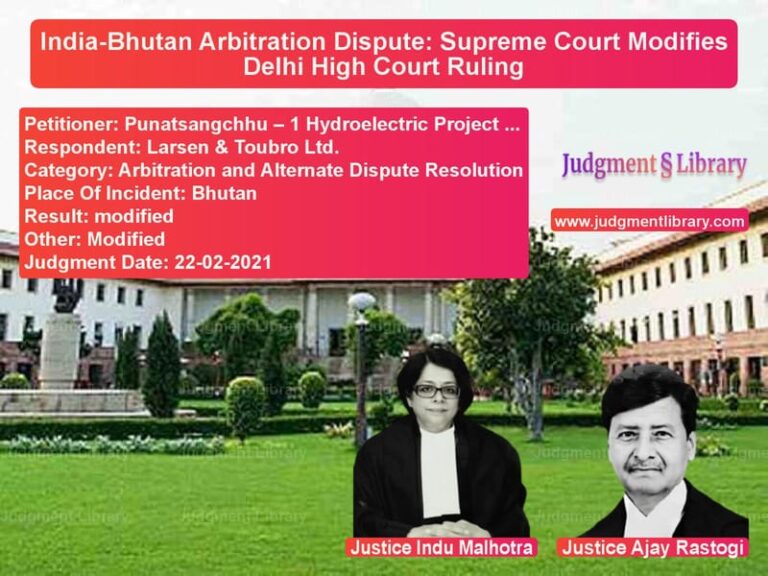Teacher Recruitment and Selection Rules: Supreme Court Ruling on Appointment Rights
The Supreme Court of India recently decided an important case related to government teacher recruitment and the validity of waiting lists when a selected candidate does not take up the job. The case, Vallampati Sathish Babu vs. The State of Andhra Pradesh, addressed the question of whether an unfilled post due to a selected candidate’s absence should be given to the next in line or be carried forward to the next recruitment cycle.
Background of the Case
In 2012, the State of Andhra Pradesh issued a notification (DSC-2012) for the recruitment of teachers. Under this process, 33 vacancies were advertised, and the selection was governed by the Andhra Pradesh Direct Recruitment for the Post of Teachers (Scheme of Selection) Rules, 2012. The rules provided a strict framework for selection, including the preparation of a selection list.
The appellant, Vallampati Sathish Babu, participated in the selection process and secured the 34th rank. The selection list was finalized with only 33 candidates, as per the number of notified vacancies. However, one of the selected candidates, ranked 18th, did not turn up for counseling and, therefore, did not join the service. Sathish Babu, who was next in line, requested that he be appointed to the unfilled vacancy.
His request was denied by the authorities, citing the absence of a waiting list as per Rule 16(5) of the Rules, 2012, which stated that there would be no waiting list and that unfilled vacancies would be carried forward to future recruitment processes. Dissatisfied with this, he approached the Andhra Pradesh Administrative Tribunal, which ruled in his favor and directed the State to appoint him.
The State government challenged this ruling before the Andhra Pradesh High Court, which overturned the Tribunal’s decision and upheld the rule that unfilled vacancies must be carried forward. The matter then reached the Supreme Court.
Arguments Presented
Petitioner’s Arguments
- The selection process is incomplete until all 33 vacancies are filled.
- Rule 16(5) states that the number of selected candidates should not exceed the number of vacancies, but it does not prohibit filling a vacancy left unfilled due to a candidate’s non-appearance for counseling.
- As per the recruitment guidelines, selection lists are finalized only after verification and counseling. Therefore, if a selected candidate fails to appear for counseling, the next eligible candidate should be considered.
- Previous court decisions, including District Educational Officer vs. B. Annapurna, held that a vacancy caused due to administrative errors or a candidate’s non-appearance should not be wasted and should be filled by the next meritorious candidate.
- The petitioner had approached the Tribunal without delay upon learning about the vacancy.
Respondents’ Arguments
- The recruitment rules clearly state that no waiting list shall be maintained.
- Rule 16(5) explicitly mandates that any unfilled vacancies should be carried forward to the next recruitment cycle.
- The selection process had concluded with the final selection list, and no further appointments could be made beyond that list.
- Referring to Bihar State Electricity Board vs. Suresh Prasad, the respondents argued that in cases where rules do not allow a waiting list, vacancies from non-joining candidates cannot be offered to lower-ranked candidates.
Supreme Court’s Judgment
The Supreme Court upheld the decision of the High Court, ruling against the petitioner. The key observations made by the Court were:
- The rules explicitly prohibit a waiting list, meaning no candidate beyond the initially selected 33 could be considered.
- Since the final selection list had been published, any vacancy arising due to a candidate’s absence must be carried forward and not filled from among non-selected candidates.
- “If the submission on behalf of the appellant is accepted, in that case, it will lead to providing for preparation of a waiting list, which otherwise is not permissible as per sub-rule (5) of Rule 16.”
- In Suresh Prasad, the Court had already ruled that where no provision for a waiting list exists, the employer is not obligated to offer the unfilled vacancy to the next in line.
Legal Principles Established
The judgment reinforced the following legal principles:
- Strict adherence to recruitment rules: Where selection rules explicitly prohibit waiting lists, courts cannot direct authorities to fill vacancies from non-selected candidates.
- Finality of selection lists: Once a final selection list is published, the recruitment process is considered closed. Any unfilled vacancies must be addressed in future recruitment cycles.
- No implicit right to appointment: Merely being next in line does not confer a legal right to appointment if the recruitment rules do not permit it.
Impact of the Judgment
This ruling has significant implications for recruitment processes across India, particularly in government job selections:
- Prevents deviation from notified rules: Government authorities must strictly adhere to recruitment guidelines and cannot appoint candidates beyond the prescribed procedure.
- Ensures transparency and predictability: Aspirants will have clarity that only listed candidates will be considered, preventing last-minute changes.
- Discourages litigation over waiting lists: Since waiting lists are explicitly prohibited, lower-ranked candidates cannot claim vacancies arising due to non-joining candidates.
Conclusion
The Supreme Court’s decision in Vallampati Sathish Babu vs. The State of Andhra Pradesh serves as a precedent for public sector recruitment. It clarifies that when rules prohibit waiting lists, authorities must follow them strictly, even if vacancies remain unfilled due to unforeseen circumstances. The ruling ensures that future recruitments remain fair and free from administrative discretion in filling vacancies beyond the notified selection list.
Petitioner Name: Vallampati Sathish Babu.Respondent Name: The State of Andhra Pradesh & Ors..Judgment By: Justice M.R. Shah, Justice B.V. Nagarathna.Place Of Incident: Andhra Pradesh.Judgment Date: 19-04-2022.
Don’t miss out on the full details! Download the complete judgment in PDF format below and gain valuable insights instantly!
Download Judgment: vallampati-sathish-b-vs-the-state-of-andhra-supreme-court-of-india-judgment-dated-19-04-2022.pdf
Directly Download Judgment: Directly download this Judgment
See all petitions in Recruitment Policies
See all petitions in Public Sector Employees
See all petitions in Termination Cases
See all petitions in Judgment by Mukeshkumar Rasikbhai Shah
See all petitions in Judgment by B.V. Nagarathna
See all petitions in dismissed
See all petitions in supreme court of India judgments April 2022
See all petitions in 2022 judgments
See all posts in Service Matters Category
See all allowed petitions in Service Matters Category
See all Dismissed petitions in Service Matters Category
See all partially allowed petitions in Service Matters Category







